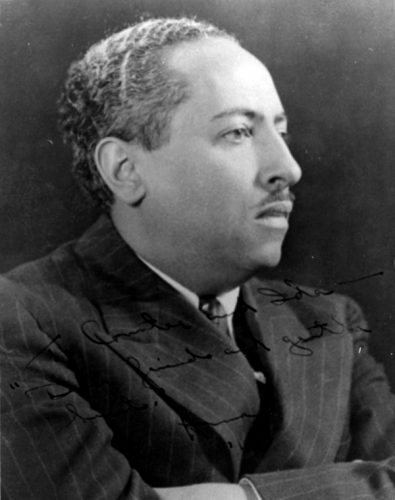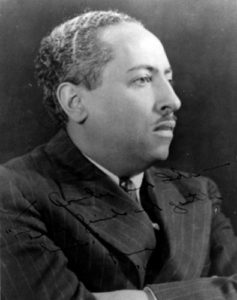Arna Wendell Bontemps
Arna Wendell Bontemps, a distinguished contributor to the writings of the Harlem Renaissance, was born in Alexandria, Louisiana.

Courtesy of State Library of Louisiana.
Black-and-white reproduction of a photograph of poet Arna Bontemps c.1945.
Arnaud (nicknamed Arna by his maternal grandmother) Wendell Bontemps was a librarian, editor, essayist, teacher, and an outstanding author of both adult and children’s fiction. The author or editor of more than thirty books about the lives and dreams of African Americans, Bontemps won two Pushkin Prizes for Poetry, a Crisis Poetry Prize, and an Opportunity Short Story Prize, as well as two prestigious Rosenwald Fellowships, all before his fortieth birthday. Bontemps’s work provides insight into the everyday lives of black Americans and their long struggle for equality. His graceful poems are hallmarks of the Harlem Renaissance, a period of intense creativity among black artists living in New York City’s Harlem neighborhood during the 1920s and 1930s. His coauthors and coeditors include Langston Hughes, Jack Conroy, and Countee Cullen, with whom Bontemps wrote the musical St. Louis Woman based on his book, God Sends Sunday.
Born October 13, 1902, in Alexandria, where he lived until he was nearly four years old, Bontemps grew up in Los Angeles, California. The eldest child of a bricklayer and a schoolteacher, Bontemps was educated at Seventh Day Adventist schools, including Pacific Union College in Angwin, California, where he earned an AB degree (the equivalent of a bachelor of arts). After his success as a Harlem Renaissance poet, Bontemps taught at Oakwood Junior College in Huntsville, Alabama, where he wrote one of his most famous short stories for adults, the award-winning “A Summer Tragedy.”
Also while in Huntsville, Bontemps began a correspondence with Langston Hughes. They decided to counteract the popular children’s story, “Little Black Sambo,” with short stories focusing on important peoples and events in African American history. The two writers collaborated on Popo and Fifina: Children of Haiti, about the lives of two children in Haiti whose father leaves a life of farming to earn a living as a fisherman. The popularity of the book, a critically praised best seller, encouraged Bontemps to publish two more children’s stories.
Bontemps in the Federal Writers’ Project and Fisk University
In the 1930s, Bontemps was appointed editorial supervisor of the Illinois office of the Federal Writers’ Project (FWP), where he collaborated with Jack Conroy, a Missouri writer. Conroy and Bontemps coauthored The Fast Sooner Hound, as well as Slappy Hooper, The Wonderful Sign Painter, and Sam Patch, The High, Wide and Handsome Jumper. The collaboration with Conroy also produced the nonfiction book, They Seek a City, about the great migration—the early twentieth-century migration of more than one million blacks from the rural South to the urban North—which the writers revised and later published as Anyplace but Here.
After fulfilling his responsibilities with the FWP, Bontemps enrolled in the University of Chicago, where he earned a master’s degree in library science. Shortly before his graduation, he was appointed head librarian at Fisk University in Nashville, Tennessee, a position he held for twenty-one years. As librarian, Bontemps acquired invaluable material chronicling African American culture and experience. With Bontemps’s encouragement, Langston Hughes and Carl Van Vechten, the former New York Times journalist who promoted Harlem Renaissance artists, contributed papers, correspondence, writings (including original sheet music from W. C. Handy and George Gershwin), and other materials to Fisk, making the university’s special collections among the nation’s finest.
Bontemps’s years at Fisk were the most productive of his life. Unwavering in his quest to improve the quality of stories suitable for young people, Bontemps continued to write children’s stories, including historical narratives of African American leaders such as Frederick Douglass, George Washington Carver, and Booker T. Washington. He published scholarly articles about black history, and produced and revised plays while editing anthologies of black literature including Golden Slippers: An Anthology of Negro Poetry for Young Readers, American Negro Poetry, Hold Fast to Dreams, and The Harlem Renaissance Remembered. He also coedited The Poetry of the Negro and The Book of Negro Folklore with Langston Hughes.
Bontemps won two Guggenheim Fellowships for his excellence in scholarship and the creative arts. The first fellowship enabled him to research Chariot in the Sky, a fictionalized but historically accurate account of the Fisk Jubilee Singers, as seen through the eyes of a young boy. The second fellowship allowed him to revise the second edition of the Story of the Negro, which won the 1956 Jane Addams Children’s Book Award. Near the end of his career at Fisk, Bontemps was in demand as a lecturer and accepted an offer to teach at the University of Illinois, Chicago Circle, during a sabbatical. After retirement from Fisk, Bontemps was offered a position at Yale University, where he was named curator of the James Weldon Johnson Collection. Bontemps returned to Fisk as a writer-in-residence before his death on June 4, 1973. The Alexandria Arna Bontemps Foundation restored his family’s home, naming it the Arna Bontemps African American Museum and Cultural Arts Center.
